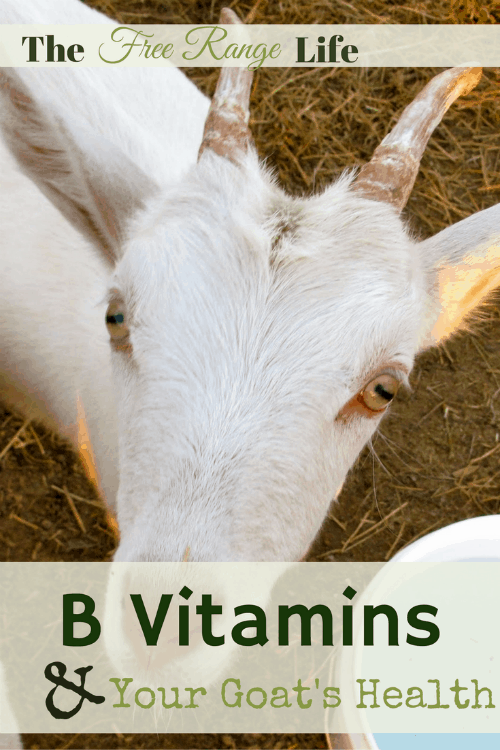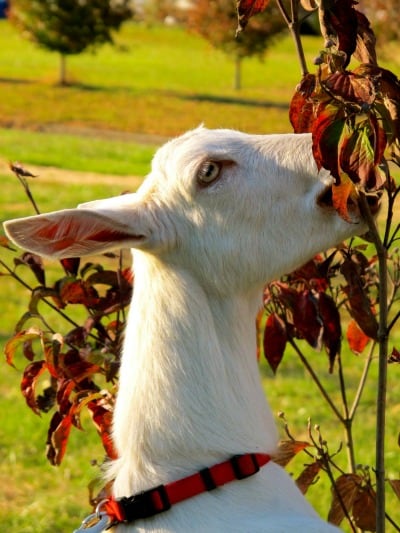B Vitamins, especially Vitamin B12 and B1 (or Thiamine), are extremely important to your goat’s health.
A healthy goat will produce all the necessary B Vitamins in its rumen and excrete any excess through the urine daily. If your goat is ill, particularly if it is off feed, it will not produce the amount of b vitamins needed.
This site contains affiliate links. If you make a purchase using one of these links, I may earn a commission. Please see my disclosure page for more information about cookies collected and our privacy policy.
Last year we had a couple of goats who escaped their fence and got into something before we discovered their escape. We found them the next morning showing both signs of toxicity and goat polio.
They were stumbling and off balance, their eyes were rolling and glassy. Thiamine was the main choice for treatment and with it they both made it through without trouble.
B Vitamins and Your Goat’s Health
Vitamin B1 (Thiamine) is needed for carbohydrate metabolism and for neural activity.Thiamine is produced in your goat’s body and when normal rumen function is compromised so it thiamine production resulting in a condition called Goat Polio.
Goat Polio- usually caused by a diet too rich in carbohydrates- will use up all the Thiamine in your goat’s system causing a near fatal deficit if not caught in time.
Treating with Thiamine injections every 6-12 hours is essential in your goat making a full recovery.
Read more about how to Diagnose and Treat Goat Polio.
Symptoms of Thiamine Deficiency in Goats:
Staggering and off-balance due to swelling in the brain
Convulsions
Visual and Motor disturbances
Circling
Rigid neck and muscle spasms
Related Reading: 10 Goat Medications to Keep on Hand
Vitamin B12 is essential in treating an anemic goat.
If your goat is off feed and showing other signs of anemia, vitamin B12 injections should be given daily until the symptoms begin to improve and then weekly for quite awhile. Vitamin B12 is essential in the rebuilding of red blood cells.
B Vitamins are all water soluble and any that are not used will be excreted, therefore the margin of safety is very wide and overdosing is hard to do.
For more information on treating anemia in goats read -> Anemia in Goats: Diagnosing and Treating
How Do You Treat a Goat with B Vitamins?
Alone, Vitamin B1 and B12, are only available through a veterinarian’s prescription. The best thing to keep on hand is Fortified Vitamin B Complex, which is available over the counter.
The most important thing to look at is the fact that your bottle says FORTIFIED and it contains 100 mg/mL of Vitamin B1.
The correct dosage for your goat is 4.5mL/100 lbs of live weight injected subcutaneously.
As I stated in my article 8 Must Have Nutritional Supplements for Goats, you should always have Fortified Vitamin B Complex on hand in your medicine cabinet.
If you are new to goats, I recommend reading up as much as you can before you purchase. You can find a lot of articles here on The Free Range Life that will teach you about goat care and be sure to check out The Busy Homesteader’s Goat Management Binder– it’s full of to-do lists, checklists, record keeping sheets, and resource pages that will get your new goat herd off to a great start!






Superb for the full explanation ,thank u
Thank u
What is the drug can boost ram sheep and goats to be bigger.
I don’t like giving needles to my goats is there anyway you could put the dosage of thiamine into their food?
We have a very sick goat on our hands. No balance , tries to eat but acts like she can’t swallow…. all we have on hand is B complex and it does have fortified B complex – we have given her 3ml (she is around 100 lbs) last night and this morning . Can we overdose her? We have LA 300 but that is all we have until Monday when the vet is back in.
You can’t really overdose on Bvitamins. They will shed any excess in their urine.
How often do you administer the b complex to an anemic goat?
I have a goat that has a large bubble on her right side I have messaged it . It is not hard there is nothing there you can push
It in and it bubbles out again. Does this have anything to do with her rumen?
I have a goat with bad diarrhea. Bad worms I have been treating, she is very anemic. Can I give the b complex every 12 hours?
Yes– give at least every 12 hours. They will eliminate extra through their urine.
Hi I have a goat that has diabetes is there anything you recommend for her, she had started losing a lot of weight and when we took her to be checked, she was clear of all parasites and worms, but they said her blood work showed she had diabetes but they wasnt sure what to do for her they were going to check on giving her insulin, have you ever had any dealings with this she is our pet goat and really want to try to help her in anyway possible. any help will be appreciated
I have a weaker goat who is having trouble with (what I think is) sore mouth. It is affecting her breathing. We have had it before, but she can’t kick the virus.
I tried nutri drench and B complex two days ago and she got better. However, I can hear her “stuffy” sounding nose again.
Would you keep trying the B complex and nurti drench daily or is it a coincidence that I thought those two things worked?
My goat had quads may 23 of this yr. She is eating good and drinking water. I am bottle feeding one of the four. She doesn’t let them drink long but there bellies feel full. She is anemic probable about a two. What can I give her. Thank you in advance
In times of family health crises, a reliable B Complex supplement is a staple. The thought of having Fortified Vitamin B Complex for goats resonates with my approach to preparedness. Wondering if a similar supplement could be a valuable addition to our family’s health regimen.